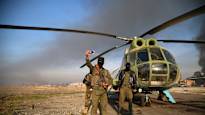Russia, which is at war against Ukraine, now has limited resources to support Syrian President Bashar al-Assad, writes Russia correspondent Heikki Heiskanen.
Heikki HeiskanenRussia correspondent
MOSCOW When Russian experts held a briefing on the situation in Syria on Tuesday, they quickly found culprits for the rapid advance of the Syrian rebels: Turkey, the United States, Britain, even Ukraine.
Russia has supported the president in the bloody Syrian civil war Bashar al-Assad administration.
The new flare-up of the conflict comes at a difficult time for Russia, when its military resources are largely tied up in the war of aggression in Ukraine. Assad’s fall would be a setback for Russia’s efforts in the Middle East.
Head of the Department of Middle East and North African Studies at the Moscow School of Economics Andrei Baklanov announced at the press center of the state-run Rossiya Segodnja news agency that there is a significant anti-Russian component to the regional mess.
The leading researcher of the Arab and Islamic Research Center of the Russian Academy of Sciences was on the same lines Boris Dolgov: the background is a plan against Russia and Syria.
– Now there is information that Turkey took part in working on this plan, as well as the security services of the United States and its allies. The anti-Russian trend is completely obvious, Dolgov said. In addition, Dolgov was sure that Ukraine has interfered and supplied weapons to the rebels.
Military expert Vladimir Yevseyev again believed that Britain, which has close relations with Turkey, is lurking in the background as a shadowy actor. Britain has achieved a kind of mythical arch-enemy status in Russian foreign policy thinking.
When looking for conspiracies, the researchers did not blame Russia itselfalthough it seems obvious that the Russian leadership, which was focused on the war in Ukraine, had left the situation in Syria for less monitoring.
The rapid advance of the forces of the extreme Islamic organization Hayat Tahrir al-Sham surprised both Assad’s forces and Russia.
The rebel push into Aleppo, Syria’s second-largest city, was a particularly bitter setback since Assad’s forces seized Aleppo in 2016 from Russia massive bombings with support.
The great powers have been involved in the bloody Syrian civil war along the waybut the rebel groups in Idlib primarily follow regional developments.
– Idlib factions estimate that Syria’s main military partners, Iran and Hezbollah, have weakened as Israel has eroded their forces, researcher Grigori Lukyanov The Center for Arab and Islamic Studies of the Russian Academy of Sciences told Yelle.
Lukyanov attributed the success of the rebel offensive primarily to internal factors: the weakening of the Syrian military and economy.
It is of course the US sanctions and the international isolation of the Syrian regime. Because of that, the Assad regime has not been able to strengthen its armed forces or solve social and economic problems.
Russia’s military operation in Syria looked like a success at the time: Russia was able to keep its ally Assad’s regime afloat and at the same time show a long nose to the United States, which hoped for Assad’s fall.
The military costs did not become unbearable for Russia either, when the heaviest price was paid by the Syrians in the population centers bombed by Russia. The use of Wagnerian mercenary forces helped the Russian leadership to hide the losses experienced on the battlefield.
Now it seems that Syria is becoming a new headache for Russia.
After the 2020 Idlib ceasefire, Russia apparently thoughtthat the situation is under control and a minimal presence would be enough to support Syria. Time doesn’t stop. Assad’s regime remained weak and fragmented. The rebels gathered their forces in the Idlib region with the help of Turkey.
Russia runs the Tartus naval research base and the Hmeimin air base in Syria. Russia is not willing to give up this military foothold in the region.
Russia has already carried out airstrikes in the Idlib region and Aleppo. The Ukrainian intelligence service has announced that Russia is possibly moving mercenaries of the former Wagner group from Africa to support the Syrian regime. So Russia would not be moving actual armed forces to Syria from Ukraine.
Russia practically disbanded the Wagner mercenary company Yevgeny Prigozhin after an ill-fated military coup. It may have weakened Russia’s influence in Syria, as Wagner maintained many contacts at the local level.
The US think tank ISW is paid attention to to the information that Russia had evacuated its ships from the Tartus naval base. ISW sees that as a possible sign that Russia is not going to send significant reinforcements to support the Assad regime.
It is still premature to say that Russia would abandon the Assad regime. However, its means of influencing the situation in the Middle East are very limited. Probably more important for Assad’s fate is how much Iran and its allies are able to support him.
